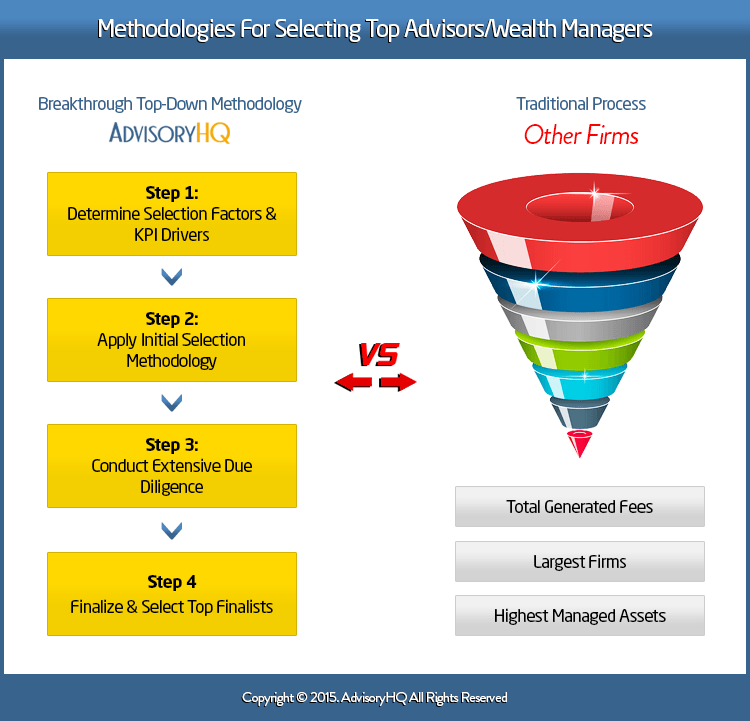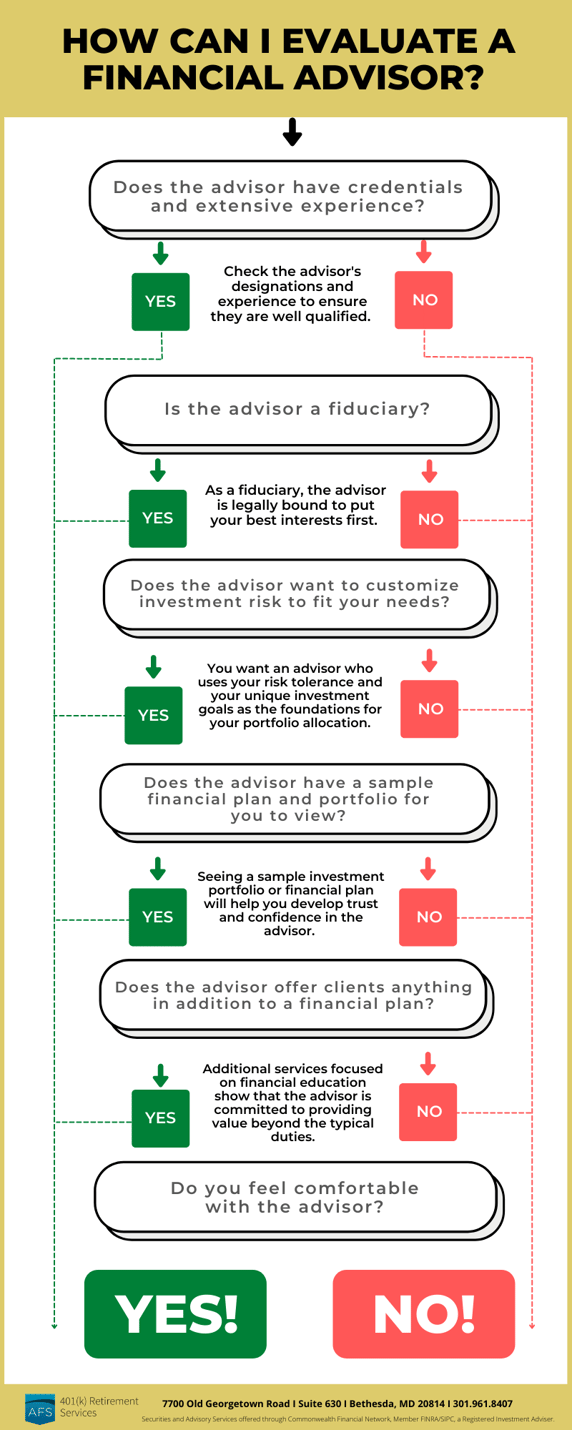
A financial advisor who is successful has several key characteristics. These qualities include a clear mission to help clients, a track of performance, reliability, and accountability. This is a requirement for anyone working in the financial services industry. A genuine caring attitude towards clients is crucial if advisors are to be successful. Financial advisors should be sensitive and understand the priorities of their clients. If they cannot relate to their clients, they should not be considered good financial advisors.
Top financial advisors listen carefully to their clients
Recent research revealed that high net worth investors feel passionately about wealth preservation, income management, and risk mitigation. However, advisors clearly identified a hierarchy of priorities. Wealth preservation, income preservation and retirement planning were their top priorities. These results showed a significant qualitative divide between clients and advisors. The top advisor should listen to the clients' goals and concerns and tailor their advice accordingly. They should also share educational content with clients on a daily basis.

They have a clear mission: to serve
There are many options for creating a mission statement to guide a financial advisory firm. An informal approach could be to hold brainstorming sessions where participants ask the question "Why is this firm here?" Find out their Why. A more structured approach might be to use the EOS framework, which focuses on values and purpose. Regardless of the approach chosen, a clear mission statement is essential for establishing a strong foundation for success.
They have a track record of performance
How can you determine if your financial advisor has a track of success? There are many different ways to evaluate an advisor's success, including the number of years they've been in the industry, the level of education they've completed, and their performance record. It doesn't matter what your financial goals might be, you can use checklists or ask questions to gauge how competent an advisor is.
They are reliable
Although most financial advisors are trustworthy and reliable, there are still some scammers who will steal your money. This is especially true of senior investors. Protect yourself against fraud by being aware of potential signs. This is best done by doing research about the firm you plan on working with. Meyer Wilson offers free case assessments. Ask your financial advisor whether he or she has been registered with the Securities and Exchange Commission.
They are highly professional
Financial advisors are experts on financial matters. They can help you make informed business decisions, understand market trends, and invest in the right places. These professionals also answer every financial question a business owner has. They can guide you through the various stages of your company's life, including the start-up and early years. Your financial adviser is the best person to turn to for financial advice. So, how do you find the right financial advisor for your business?

They are conscientious
A conscientious advisor is able to think for the long-term, and to be committed to a task. He or she listens intently to his or her clients' concerns and engages in a dialogue to uncover issues that may underlie those concerns. These conversations may last weeks, months or years. They enable clients to see that advisors are aware of their needs and want and are committed to fulfilling them.
FAQ
What is estate plan?
Estate planning is the process of creating an estate plan that includes documents like wills, trusts and powers of attorney. These documents are necessary to protect your assets and ensure you can continue to manage them after you die.
What is risk management in investment administration?
Risk management is the art of managing risks through the assessment and mitigation of potential losses. It involves monitoring and controlling risk.
A key part of any investment strategy is risk mitigation. The goal of risk management is to minimize the chance of loss and maximize investment return.
The following are key elements to risk management:
-
Identifying the risk factors
-
Measuring and monitoring the risk
-
How to reduce the risk
-
Managing the risk
Who Can Help Me With My Retirement Planning?
For many people, retirement planning is an enormous financial challenge. It's more than just saving for yourself. You also have to make sure that you have enough money in your retirement fund to support your family.
Remember that there are several ways to calculate the amount you should save depending on where you are at in life.
If you are married, you will need to account for any joint savings and also provide for your personal spending needs. Singles may find it helpful to consider how much money you would like to spend each month on yourself and then use that figure to determine how much to save.
If you are working and wish to save now, you can set up a regular monthly pension contribution. Consider investing in shares and other investments that will give you long-term growth.
Talk to a financial advisor, wealth manager or wealth manager to learn more about these options.
Who should use a Wealth Manager
Anyone who is looking to build wealth needs to be aware of the potential risks.
For those who aren't familiar with investing, the idea of risk might be confusing. Poor investment decisions can lead to financial loss.
This is true even for those who are already wealthy. Some may believe they have enough money that will last them a lifetime. However, this is not always the case and they can lose everything if you aren't careful.
Every person must consider their personal circumstances before deciding whether or not to use a wealth manager.
Statistics
- According to Indeed, the average salary for a wealth manager in the United States in 2022 was $79,395.6 (investopedia.com)
- Newer, fully-automated Roboadvisor platforms intended as wealth management tools for ordinary individuals often charge far less than 1% per year of AUM and come with low minimum account balances to get started. (investopedia.com)
- A recent survey of financial advisors finds the median advisory fee (up to $1 million AUM) is just around 1%.1 (investopedia.com)
- US resident who opens a new IBKR Pro individual or joint account receives a 0.25% rate reduction on margin loans. (nerdwallet.com)
External Links
How To
How to save on your salary
Working hard to save your salary is one way to save. These are the steps you should follow if you want to reduce your salary.
-
Start working earlier.
-
It is important to cut down on unnecessary expenditures.
-
Online shopping sites such as Amazon and Flipkart are a good option.
-
You should do your homework at night.
-
You must take care your health.
-
Your income should be increased.
-
It is important to live a simple lifestyle.
-
It is important to learn new things.
-
It is important to share your knowledge.
-
Read books often.
-
Rich people should be your friends.
-
It is important to save money each month.
-
For rainy days, you should have money saved.
-
Plan your future.
-
Time is not something to be wasted.
-
Positive thinking is important.
-
You should try to avoid negative thoughts.
-
You should give priority to God and religion.
-
Good relationships are essential for maintaining good relations with people.
-
Enjoy your hobbies.
-
Try to be independent.
-
You should spend less than what you earn.
-
You should keep yourself busy.
-
Be patient.
-
Always remember that eventually everything will end. So, it's better to be prepared.
-
You shouldn't ever borrow money from banks.
-
It is important to resolve problems as soon as they occur.
-
It is important to continue your education.
-
It is important to manage your finances well.
-
Honesty is key to a successful relationship with anyone.